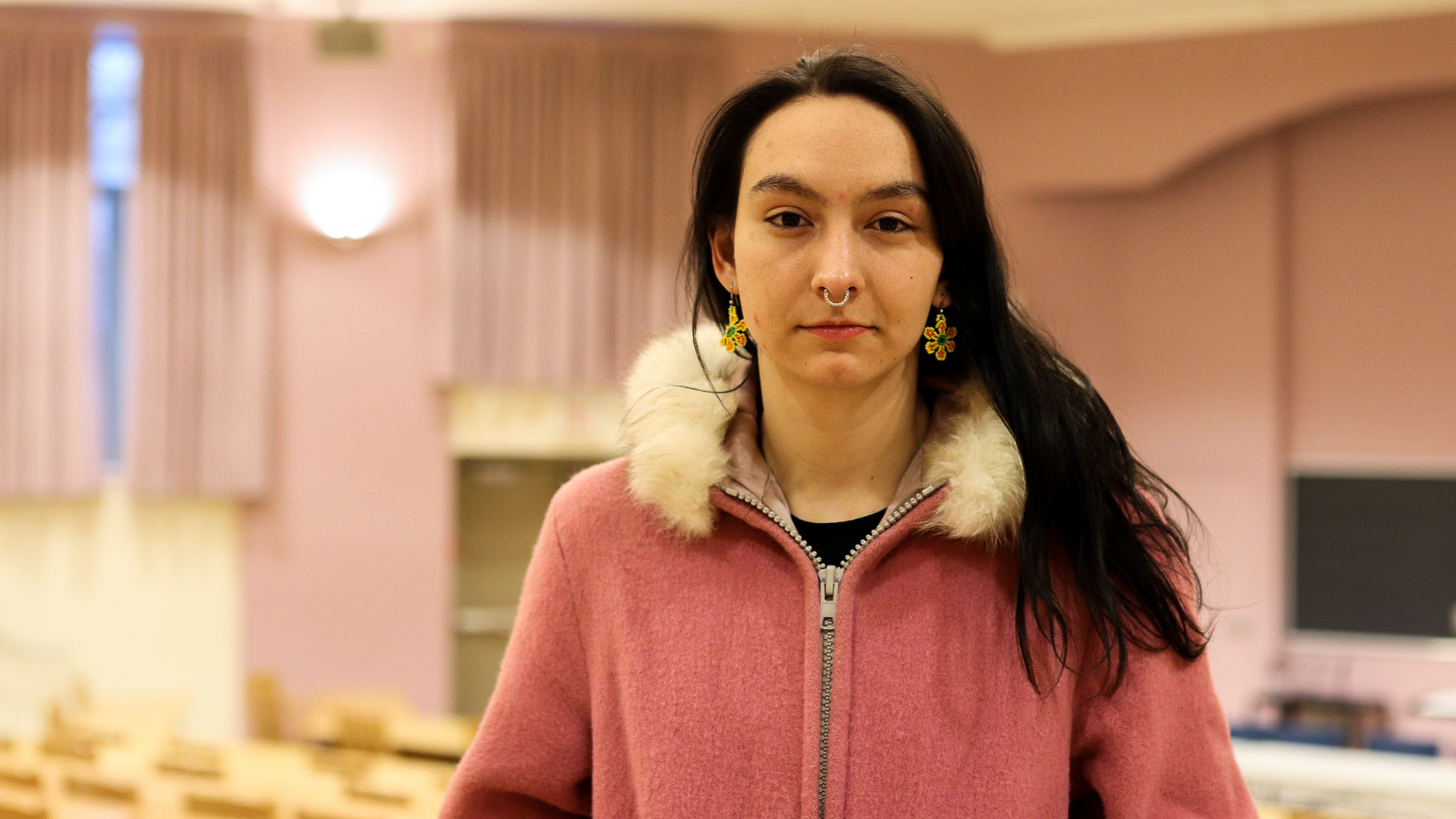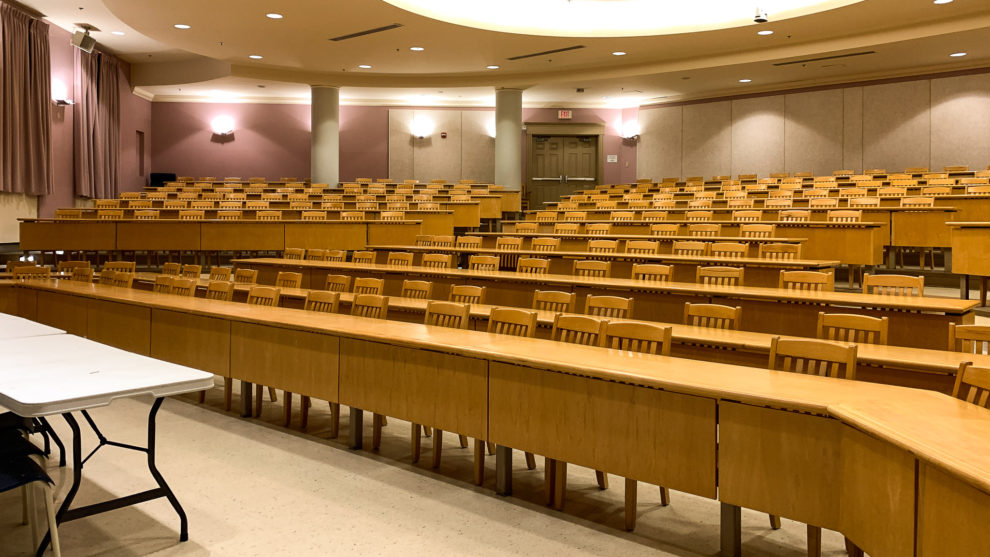Organizers of Halifax reconciliation lecture failed to make room for Indigenous students
Kim TallBear presented this year's MacLennan Lecture at the University of King's College at the end of January

caption
Naomi Bird stands inside of Alumni Hall at the University of King's College.A Halifax student is questioning why organizers didn’t make room for Indigenous students at a lecture about decolonization and reconciliation late last month.
Naomi Bird, a Cree and two-spirit student at Dalhousie, screamed in excitement after hearing Kim TallBear was coming to speak in Halifax. But this excitement quickly faded on the evening of TallBear’s lecture.
TallBear, Canada Research Chair in Indigenous Peoples and a professor at the University of Alberta, came to speak about decolonization and reconciliation during the third annual MacLennan Lecture at the University of King’s College on Jan. 30.
So many people attended that ushers had to close off the main lecture hall and move people in two separate rooms to watch livestreams.
Being shut out
Bird was one of the people ushered into the rooms, along with several other people from the black, Indigenous and people of colour (BIPOC) communities.
“It just seemed very unfair that this is very much a once in a lifetime experience for … everyone, but especially us, to see ourselves represented in this academic space,” said Bird, who’s studying sustainability and urban planning.
After the lecture, Bird tweeted about the lack of prioritization for the BIPOC community.
Why didn’t the organizers of @KimTallBear’s talk @ukings prioritize BIPOC folks in being able to sit in the main lecture hall? The main room is overcapacity & so many racialized students/community members have been sent to another room to watch a livestream. @dalsustlife ??
— Naomi (@Cree_binch) January 30, 2020
The University of King’s College’s history of science and technology program hosts the annual MacLennan Lecture. This year, Dalhousie University’s college of sustainability joined to collaborate.
Usually, the event is held in the University of King’s College’s Alumni Hall, a lecture hall with a maximum capacity of 456 people. As Alumni Hall reached capacity, ushers had to move people to Prince Hall — the university’s meal hall — and the KTS Lecture Hall.
“They knew beforehand that it would be busy and I don’t know why there wasn’t a bigger space,” Bird said.
“It felt kind of like an insult to be like, ‘We have this really cool speaker, we have this many students that have to be at this, but we’re going to cram everyone into a tiny little room.’”
Since the lecture’s topic related to sustainability, Dalhousie University students enrolled in the sustainability program’s introductory course were required to attend the lecture, one of many evening lectures throughout the year-long course. A total of 291 people are enrolled.
“I was just like, ‘Why did you have to specifically be in this room, especially if it’s just a class you have to go to when there’s community members who’ve been so excited for this?’” Bird said.
After being fed up with watching a low-quality and glitchy livestream, Bird made their way into the main lecture hall. They said they had to sit on the steps of the lecture hall while watching “settlers” sit in seats and take notes on a lecture about reconciliation.
At the end of TallBear’s lecture, Aaron Prosper, Dalhousie Student Union’s first Mi’kmaw president, asked why reconciliation and decolonizing spaces were being discussed, but several Indigenous students were stuck in other rooms to watch this event on a livestream.
Right after Prosper’s question, Bird asked TallBear if they could invite Indigenous students in the room so they could participate.
“’Because if they came all this way, there might be something that you could offer them. I think that’s who should be asking you questions,’” they said.
Following their question, they said around 30 people left the lecture hall and offered their seats to Indigenous students.
“It was very intense, like powerful,” Bird said. “I was just like, ‘This is not what I was expecting,’ and I feel like people really got it in that moment. It made me feel really happy.”
But Bird said they didn’t think people should’ve had to leave the lecture hall and miss the question period.
While the first two rows of the lecture hall were reserved for Indigenous elders, faculty and partners, no seats were reserved for BIPOC students or community members. Bird said organizers could’ve reserved 20 to 30 seats for BIPOC.

caption
Alumni Hall at the University of King’s College.Organizing an event
Gordon McOuat, the director of the University of King’s College’s history of science and technology program, said organizers were overwhelmed on the evening of the event.
“We didn’t know that that many people would come,” he said.
Throughout the week before the MacLennan Lecture, TallBear had been speaking at other events in the city. McOuat said things were building to a “crescendo.”
“Then when we saw the clicks on social media happening, there was a, ‘Oh my goodness, this has really got to come together in ways that are not a disaster,’” he said.
“These things will always be somewhat fraught in the sense that we are still in a colonial situation where people are left out and such. The negotiation and consultation with the parties that are involved is most important, rather than me making a fiat decision.”
One reason organizers didn’t want to book a larger lecture hall was because University of King’s College funds the MacLennan Lecture and they want to keep “King’s things from dissipating and just becoming Dalhousie things,” McOuat said.
McOuat also said while the people who work on facilities at the University of King’s College do a great job, the facilities themselves are “outdated as hell” and employees have a limited budget.
Still, McOuat said he’s been to many meetings in broadcast rooms where he finds the environment more intimate because the projected video is so large.
“Rather than flying her out here, [what if] we did it on a big screen in a room, intimate or not — damn cool,” he said.
“It would be the way of the future. But there might be something about a certain ways of racialized cultures that say, ‘The proximity matters to me.’”
How distance matters
Patti Doyle-Bedwell, a Mi’kmaw professor of native studies at Dalhousie University, said this proximity matters in these situations.
“I can’t emphasize enough how important it is to have that personal connection with people who are Indigenous, who are professors, who look like you, who have accomplished something within an environment that is so colonized and at times racist,” she said.
When Doyle-Bedwell was studying at Dalhousie University in the 1990s, Mohawk lawyer and activist Patricia Monture-Angus gave a talk in the sociology department.
Doyle-Bedwell said the two were able to meet.
“She was willing to be connected, she was willing to support me, she was willing to be a mentor to me,” she said.
“And that was really important because you need to see people that look like you, that are doing the things that you might want to be doing some day. If I hadn’t had that same opportunity to be in the same room as her, listen to her speak, meet her, that could have changed my life.”
Doyle-Bedwell also said when Angela Davis came to the university in 2018, she watched the livestream. The experience was much different than being in the same room.
“It’s not the same. Because it’s just like you’re watching TV,” Doyle-Bedwell said. “You don’t have that personal interaction, you don’t get to catch … the environment that she’s speaking in, the questions that people might ask. So, I think it’s so important to be in the same room.”
Still, she said it’s important that after all this time, these issues are getting attention. When she was going to university, there were no Indigenous professors. She said if someone brought up an Indigenous topic, “you were told to get lost.”
Now, things are different. In 2015, Dalhousie University launched its Indigenous studies minor. There are also several minor programs related to BIPOC communities like Chinese studies, black and African diaspora studies and Arabic studies.
In events like the MacLennan Lecture, Doyle-Bedwell said it’s important to ask what the affected community needs. In this case, she said the students should’ve been involved in the planning process.
From a student’s perspective
As a student, Naomi Bird would like to see more changes come to Dalhousie University’s treatment of BIPOC.
On top of studying both sustainability and urban planning, Bird is minoring in Indigenous studies.
Still, they have some issues with the program.
Bird said the program barely exists. While the program head does a lot and there are some professors, there could be improvements. For one, the Indigenous studies program doesn’t have a physical space for its department.
Bird also said they’d like to take an Indigenous studies class with just Indigenous students, or one that’s more advanced. Many of the classes just touch on the basics of Indigenous studies. Bird said their thesis supervisor wonders what it would be like to teach what they’re actually passionate about rather than having to start from the beginning and bring everyone up to speed.
Twyla Baker, president of Nueta Hidatsa Sahnish College, coined a term called “translation exhaustion,” which explains this situation.
A group of my Indigenous colleagues and I put voice to a feeling we’ve all experienced at multiple points in our journeys, and I wanted to get it down before I lost it. It may have already been defined elsewhere, and it’s going to evolve as I explore it – but this is a start. pic.twitter.com/DtbKpZtqXi
— Dr. Twyla Baker (@Indigenia) January 22, 2019
With issues affecting an entire group of people, it’s difficult for just one side to create change.
Bird said people can’t expect Indigenous people to always do the work. They said, “Decolonizing is what settlers can do and Indigenization is what Indigenous people can do.”
Even today, it’s clear change is still necessary, according to Doyle-Bedwell.
“The whole issue of decolonization and reconciliation is to do things differently,” she said.
“Because the way that things have been working and the way we’ve been doing things hasn’t worked for the last 200 years of Dal in terms of Indigenous issues.”
About the author
Chris Stoodley
Chris is a fourth-year student at the University of King's College. He's a big fan of all things visual and loves to keep up with the world of...
